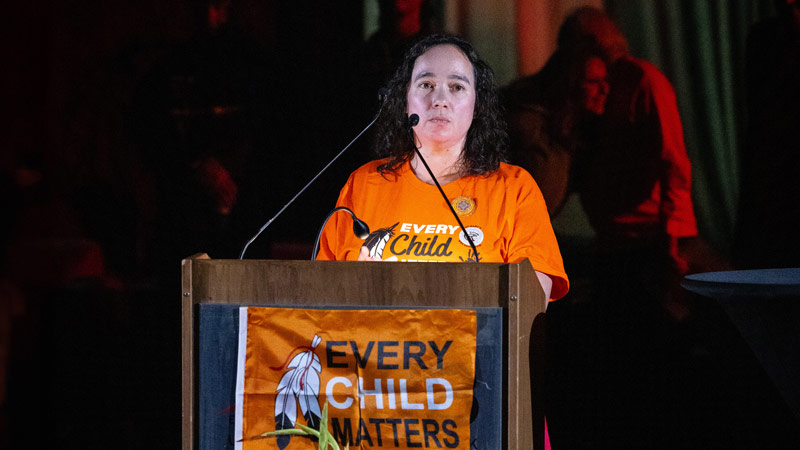UNB's newest Piluwitahasuwin will lead Indigenous engagement and outreach
Author: Angie Deveau
Posted on Oct 4, 2023
Category: UNB Saint John , UNB Fredericton

Cheyenne Joseph, an Indigenous advocate, leader and trailblazer, will be officially installed as the University of New Brunswick’s (UNB) newest Piluwitahasuwin, associate vice president of Indigenous engagement on Oct. 10.
With a background in Indigenous education, cultural revitalization and community empowerment, Joseph brings knowledge and experience to steer the university in its commitment to Indigenous reconciliation and engagement.
Joseph’s involvement in her Mi'kmaq community as a member of the Bear River First Nation in Nova Scotia has shaped her academic and healthcare career. As a registered nurse and educator, she champions Indigenous representation and culturally safe healthcare services.
As Piluwitahasuwin, Joseph wants to create a network that will enable Indigenous communities, government agencies and the university to communicate seamlessly.
"I plan to develop networks to enable community leaders, directors of education, health or other community agencies to have an ongoing dialogue about research priorities related to the Indigenous communities they serve," she said. “I want to be able to match community-led research with researchers and teams that can support those community-driven priorities."
With two bachelor of science degrees and a master of public health, Joseph has continually refined her skills and deepened her public health knowledge. She is currently pursuing a doctorate at the University of Toronto's Dalla Lana School of Public Health.
Since joining UNB in 2013, Joseph has been an integral part of the institution's academic landscape. In her capacity as a senior nursing instructor at UNB, she was instrumental in the development of the Indigenous health course. This course integrates Indigenous perspectives and knowledge into the core curriculum for nursing students.
This was a crucial step in fostering cultural competence and healthcare understanding. Her pioneering efforts in Indigenous health education have established her as a trailblazer.
She was also part of UNB’s Truth and Reconciliation Committee (TRC) in 2018. She worked with committee members to form an action plan to create a senior-level position at the university for an Indigenous leader.
“Institutions are determined to do right by the TRC, which means responding to its recommendations,” said Joseph. “I've worked with many organizations, small and large, and they're all at different stages of their growth and journey in this area. I felt like I bring that experience with me to this role. I wanted to scale it up and work with an academic institution where there is a deep desire to do it better and do it well.”
As Piluwitahasuwin, Joseph will oversee UNB's Indigenous reconciliation and engagement activities. Her responsibilities will include cultural sensitivity training, partnerships, student support, curriculum integration and cultural awareness initiatives.
She said education plays a pivotal role in her process and that an inclusive society can be built by acknowledging and valuing Indigenous knowledge and ways of being and doing.
"I believe it’s crucial to provide a welcoming environment for Indigenous students, staff and faculty at the university," she said. "We want Indigenous students to have their voices heard by the faculty that teach them. We also want them reflected in our buildings, programs and partnerships."
She also said she wants to be very intentional about where she spends her time.
“I will make sure I connect with the right people that can contribute to the work we're trying to do,” she said. “Through my previous work, I created networks and realized where gaps existed or where I could learn more. I genuinely want to do this right for the People, for my Nation.”
